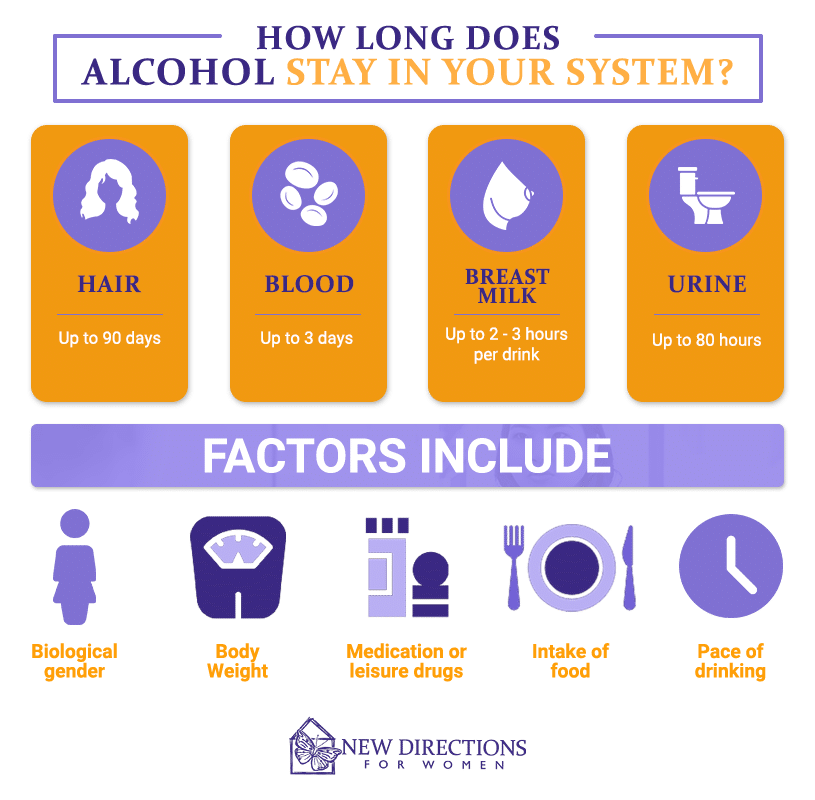Many people ask “How long does alcohol stay in your system?” for several reasons. You may get a test at work or you may be able to sign up for a detox program. The answers to this and related questions are determined by a range of factors. For various parts of the body, alcohol remains there at different times. This determines how long a person takes to reach a sobriety status.
Here are some other questions we’ve answered about how long alcohol stays in your system.
How Long Does Alcohol Stay In Your Urine?
Alcohol stays in your urine for about eighty hours.
How Long Does Alcohol Stay in Your Hair Follicles?
Alcohol stays in hair follicles for about three months.
How Long Does Alcohol Stay in Your Breast Milk?
It stays in your breast milk for roughly two to three hours per drink.
How Long Does Alcohol Stay in Your Blood?
The average liver can process one drink per hour.
It is important to bear in mind that every drink is different from the other. Even one beer is less strong than a shot of vodka. A glass of wine usually can get you drunk quickly compared with a cocktail.
Eating is very important while drinking. If you drink on an empty stomach, alcohol will attack you quickly. On the other hand, a full stomach mitigates the effects of it and delays the so-called “hangover.” To really answer the question, “How long does alcohol stay in your system?” you should consider some elements such as:
- biological gender
- body weight
- medication or leisure drugs
- intake of food
- health problems
- and pace of drinking
This means that the drink does not go down at the same pace for two people. However, the treatment for most people is remarkably consistent. We will provide all the clinical services needed from you. We at New Directions for Women work with the patient to investigate past traumas and potential contributing factors to their addiction issues. From spirituality and meditation to aftercare and follow-up, you or your loved one will have all the clinical services needed to go through this process.
Alcohol And Gender
 Several physiological factors make a woman more quickly feel the effects of drinking than a man. This is true for several reasons:
Several physiological factors make a woman more quickly feel the effects of drinking than a man. This is true for several reasons:
- Women’s bodies have less water than men’s – water makes up 52% of a woman’s body, compared to 61% of a man’s. A man could therefore dilute more alcohol than a woman.
- Women tend to have more body fat than men of the same weight, and alcohol cannot be diluted into fat.
- Women have less ADH, an enzyme that breaks alcohol, than men.
- The metabolism of the drink slows down at a woman’s premenstrual stage, causing more of it to enter the bloodstream.
Unfortunately, women are more likely to feel shame and guilt about their addiction. They’re also more likely to delay seeking professional help and proper treatment. We fully support women who are looking for help to restart their life.

How Long Does It Take to Sober Up?
Everyone processes a drink differently, depending on different factors. The rate of alcohol metabolization in your body determines how long it takes to get drunk and supple. Most people feel the effects of drinking for about 12 hours afterward. Many factors influence how long it takes to sober up, such as:
- Age
- Weight
- Stomach content when consuming different drinks
- Medications
- Liver health
- Speed of consumption
- How much has been taken
The truth is that there is no sobering treatment. Eating and hydrating help your body return to normal and feel more comfortable after a binge, but time is the only real way to sob.
What is Alcohol Addiction?
Alcoholism, also known as alcohol addiction, is a disease that affects people from all walks of life. Experts have attempted to identify factors such as genetics, gender, race, or socioeconomic status that may predispose someone to alcoholism. However, there is more than one reason. There are a lot of factors playing a role in the disease’s occurrence.
It is critical to recognize that this is a disease. Because addiction can alter the brain and neurochemistry, a person suffering from this disease may be unable to control their actions.
New Directions for Women is founded on the principle of treating women of any age or culture with addictions with dignity and grace in a gender-specific setting.
How Does Alcohol Affect the Body and Brain?
Typically, alcohol enters the body through the mouth. It then passes through the esophagus and into the stomach. The stomach is where alcohol metabolism begins. Firstly, in the stomach, approximately 20% of the alcohol that enters the bloodstream is metabolized.
The remaining alcohol moves through the small intestine, where it comes into contact with more blood vessels. Secondly, the small intestine absorbs approximately 80% of the alcohol that does not enter the bloodstream via the stomach.
It is rapidly transported throughout the body once it enters the bloodstream, which is why it affects so many different body systems. The body is extremely successful in treating it if it’s not taken so fast. Of all the alcohol that enters the body, between 90 and 98% is metabolized and absorbed.
You can also consult our team if you feel that sometimes you drink too much, your drink is problematic or your family has concerns about your drinking. Since denial is common, you may not feel that you have a drinking problem. But to admit, that is the first step to starting the process of being healthy and sober.
We know that detox is not always the greatest place to be. Our goal is to ensure that the detox process for each of our patients is as easy and pain-free as possible.
What Are The Symptoms Of Alcoholism?
The number of symptoms you experience determines whether your alcohol use disorder is mild, moderate, or severe. Among the signs and symptoms are:
- You are unable to limit the amount that you consume.
- Wanting to cut back on your drinking or making futile attempts to do so.
- Feeling a strong desire to consume a drink all the time.
- Giving up or reducing social, work, and outdoor activities.
- Drinking in unsafe situations, such as while driving or taking medication.
- Developing a tolerance to alcohol, such that you require more to feel its effects or have a reduced effect from the same amount.
- Experiencing withdrawal symptoms such as nausea, sweating, and shaking when not drinking. As a result, you may drink to avoid these symptoms.
What Are Treatment Options for Alcohol Use Disorder?
 Discuss your goals with our doctors. Are you attempting to drink less or completely avoid it? You can begin to develop a treatment plan together. Our experts can also refer you to a specific program and assist you all the time. Our professional team will make sure that you will receive all the care needed, using different exercises or therapy. You become conscious of the emotions and thoughts that may have led to substance abuse, as a result of these methods.
Discuss your goals with our doctors. Are you attempting to drink less or completely avoid it? You can begin to develop a treatment plan together. Our experts can also refer you to a specific program and assist you all the time. Our professional team will make sure that you will receive all the care needed, using different exercises or therapy. You become conscious of the emotions and thoughts that may have led to substance abuse, as a result of these methods.
When you are not able to control yourself while drinking and have problems with your feelings when you’re not doing it, this is called alcohol use disorder. However, this is a brain disease. This kind of “poison” alters your brain, making it difficult to quit. That’s why trying to tough it out on your own can be like trying to cure appendicitis with happy thoughts.
With us, you will learn more about this kind of disorder and your treatment options are an important first step. Our staff will assist you in making a diagnosis. They may diagnose you that you need help if you:
- You have the feeling that you must consume alcohol.
- You have no control over the amount you consume.
- When you are unable to consume it, you feel bad about yourself.
New Directions for Women Can Help
Alcohol use disorder is not a common commodity. While many people associate it with pleasure and sociability, the negative consequences of its use are diverse and widespread. Globally, policies must take into account specific situations in different societies to reduce the harm caused by alcohol.
In a four-decade history, we have managed to help women, families, and children in their recovery from this addiction. Selecting a rehabilitation program is a delicate and life-changing decision. This is going to prepare you with the right background information and an understanding of your own needs and goals. Our hope is that you’ll be able to find the program that’s the best fit for you.
New Directions for Women will assist you or a loved one find and get fit into a treatment program. Our treatments have proven that we will give you the best opportunity to find peace and recovery. If you or a loved one is struggling with addiction to alcohol, please contact us today.
References:
- https://www.healthline.com/health/addiction/alcohol
- https://www.healthline.com/health/how-long-does-alcohol-stay-in-your-system
- https://www.verywellmind.com/how-long-does-alcohol-stay-in-your-system-80218
- https://www.rehabspot.com/alcohol/how-long-alcohol-stay-your-system/
- https://www.silverpinestreatmentcenter.com/addiction-blog/how-can-i-flush-alcohol-out-of-my-system/
- https://www.drugrehab.com/addiction/alcohol/how-long-does-alcohol-stay-in-your-system/
- https://www.niaaa.nih.gov/publications/brochures-and-fact-sheets/treatment-alcohol-problems-finding-and-getting-help
- https://www.everydayhealth.com/alcoholism/guide/












